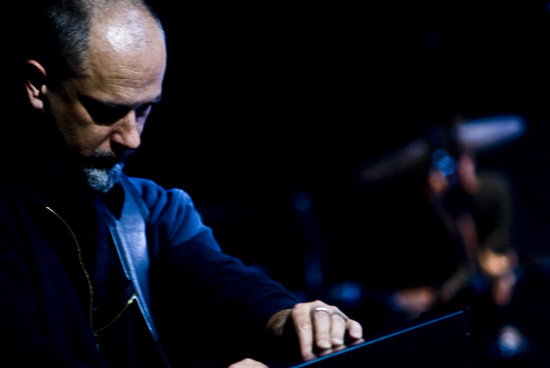It’s not often that you’ll see the words ‘doom metal’ and ‘unpredictable’ together in a sentence, and yet when discussing Obake those are the words that immediately spring to mind. The avant-garde collective released their second album Mutations late last year, showcasing a unique take on a genre that is unashamedly unchanging in tone and delivery. The improvisational elements that dominated their self-titled debut from 2011 have taken the back seat, replaced by a more calculated and structured method of performance. The band will be headlining the Quietus-curated stage at Camden’s Underworld tomorrow, lining up alongside Palehorse, Shit & Shine, Sex Swing and Bong. Ahead of their appearance we spoke to guitarist Eraldo Bernocchi about their constantly morphing sound and intense live performance.
You’ve said that what you do changes every time you go into the studio or onto a stage. Are these changes decided before or are they more spontaneous? Do you have any ideas about the type of performance you’ll be giving on the Quietus stage at Desertfest?
Eraldo Bernocchi: That applies especially to the first record, where improvisation was a major element of Obake. We now have real structured pieces, where there’s always a space or a break that we can use to improvise. It’s like a land we can populate with new elements. Let’s say we play ‘infected’ songs. With Desertfest we are going to present our second album Mutations live, and it’s much better.
Obake is a collaboration between a group of musicians who had all been involved in a massive amount of projects prior to the band’s formation. Some members are still actively participating in those projects as well as Obake. Do you think that any of these groups have influenced the direction of the band?
EB: We are the product of our experiences. In one way or another everyone is influenced by his own path, but we like to think Obake is now a self-sufficient entity; a full-time band with a future of its own to discover. It started as a side project as each of us had our own priorities. It became a priority itself, even if each one of us is pursuing other ventures and we collaborate with a lot of different artists.
Colin Edwin of Porcupine Tree recently joined the band as a replacement for former bassist Massimo Pupillo. What impact did this have on the band? Has it changed the direction of future releases or live shows?
EB: We are more groovy. Colin is a fantastic player and he’s a mean rhythm machine. Obake is now more direct than before. Massimo is undeniably a great musician, but we really believe everything happens at the right moment and that Colin arrived at the right moment.
You’ve said that you recorded the first album without thinking, and that you enjoy playing the older material live because you change it constantly. Did any of the material that you improvised on stage end up on the second record? Will any be on future releases?
EB: Well… we also recorded the second one without thinking. What we mean is that we don’t plan anything, we don’t choose any genre or direction, we just play and create on the spot. When something powerful or interesting comes up we concentrate on that and new songs are born.
Yes. There’ll most likely be some on future releases. We are right now scheduling the third album recording sessions for September.
Mutations was released in 2014, though you’d previously expected it to be available in 2013. Have you begun to consider returning to the studio or writing new material? Do you think that when you do, the music will continue to be crossover doom metal, or focus on the faster elements that appeared on Mutations?
EB: As we said before, September will be the month. As far as the direction we really don’t know. We’d like the next album to be heavier than the others but we really have no idea where we will end up. We’d like to create even more contrast between the heavy parts and the ambient ones. Every time we are doing our best to distil the best bits and pieces of what we did before.
One of the most interesting things that I find about Obake is the way that Lorenzo Esposito Fornasari uses his voice. It’s treated more like an instrument rather than just a way to present the lyrics. What was the band hoping to achieve by treating the vocals this way?
EB: As long as our main goal is to keep the emotional and instinctive part of our music as it is his approach fits perfectly with our intentions as he’s able to improvise and to literally mutate and become one with the whole band arrangements and structures.
You’re currently signed to RareNoise Records. Are you familiar with the other artists on the label? Is there anyone (on the roster or otherwise) that you’re listening to at the moment and would recommend our readers try?
EB: I’d suggest Metallic Taste Of Blood. The new album is coming out in a month and it’s my second metal-oriented project. Colin is the other mind behind it and this time we have Ted Parsons on drums. Merzbow with Thurston Moore and Balázs Pándi among the others. RareNoise has such a major rooster now that it’s quite difficult to suggest bands. Colin Edwin and Lorenzo Feliciati’s Twiscapes. I’m listening non-stop to Triptykon, Thanatos, the new Napalm Death and tons of drone music.


